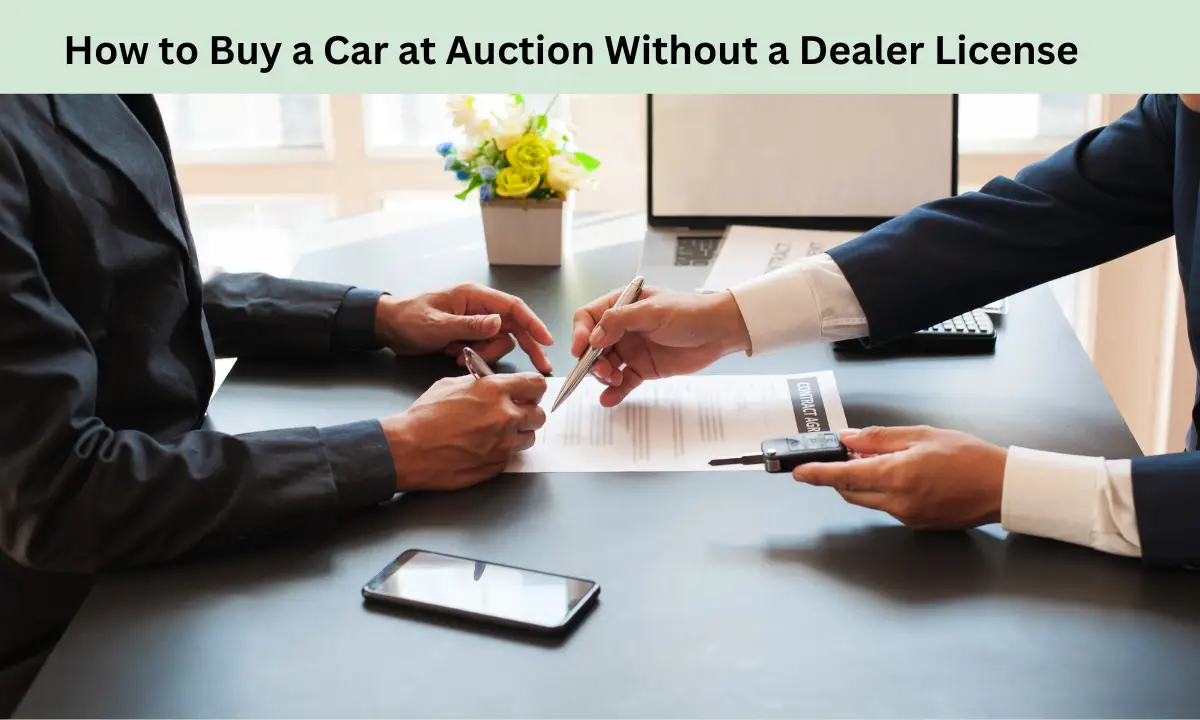> Blog > How to Buy a Car at Auction Without a Dealer License in 2024
How to Buy a Car at Auction Without a Dealer License in 2024

While auctions have traditionally been reserved for licensed dealers, it is entirely possible for individuals to participate and acquire a car without holding a dealer license. By following certain guidelines and understanding the process, savvy buyers can navigate auctions confidently and successfully. In this guide, we will explore the essential steps and tips to help you on How to buy a car at auction without a dealer license.
From research and preparation to bidding strategies and paperwork, this comprehensive guide aims to empower aspiring car owners to make informed decisions and make their auction experience a rewarding one. So, let’s dive in and unlock the secrets of securing a fantastic deal on your next vehicle purchase!
Table of Contents
How to Buy a Car at Auction Without a Dealer License?
While most car auctions require a dealer license for participation, some auction houses may offer the option to negotiate for a one-time license. This temporary license grants individuals access to the auction floor for a specific event, allowing them to bid and purchase vehicles without the need for a full-time dealer license. Here’s how you can go about negotiating for a one-time license:
Start by researching various auction houses in your area or region. Look for ones known to occasionally offer one-time licenses to individual buyers. Check their websites or contact their customer service to inquire about their policies regarding temporary licenses.
Reach out to the auction house you’re interested in attending and express your desire for a one-time license. Be polite and explain your intentions clearly. They will likely provide you with information on any upcoming auctions that offer this opportunity.
Before proceeding, make sure to understand the terms and conditions of the one-time license. Some auction houses may charge a fee for issuing the temporary license, and there might be restrictions on the number of vehicles you can bid on or purchase.
To obtain the one-time license, you may need to provide certain documents, such as a valid driver’s license, proof of insurance, and possibly a refundable deposit. Be prepared to fulfill these requirements promptly.
Having a Friend Help You
Having a friend with a dealer license can be a valuable asset if you want to buy a car at an auction without holding a license yourself. While your friend’s license enables them to participate in dealer-only auctions, they can assist you in making a purchase by acting as a proxy bidder. Here’s how having a friend help you can work:
Approach a friend or acquaintance who holds a valid dealer license and discuss your interest in purchasing a car at an auction. Make sure you trust this person and feel comfortable working together.
Before proceeding, it’s essential to understand the legal implications and responsibilities involved. As the license holder, your friend will be the official bidder and buyer on record for any vehicle you wish to purchase.
Bid on No-License-Required Auctions
One of the most straightforward ways to buy a car at an auction without a dealer license is to participate in no-license-required auctions. These auctions are open to the general public, allowing individuals to bid and purchase vehicles without the need for any specialized licenses. Here’s how you can take advantage of such auctions:
Start by researching auction houses that regularly host no-license-required events. These auctions are often advertised as public or government auctions and are accessible to anyone interested in buying a vehicle.
Look for auction listings in newspapers, online classifieds, or auction-specific websites. Local government agencies, law enforcement, or public auction houses are common hosts for these events.
Ask for Help from an Auto Broker
If you’re interested in buying a car at an auction without a dealer license but prefer not to attend the auction yourself, seeking assistance from an auto broker can be a viable option. Auto brokers are professionals who specialize in helping clients find and purchase vehicles. Here’s how you can ask for help from an auto broker:
Start by researching and identifying reputable auto brokers in your area. Look for brokers with a proven track record of successful transactions and positive customer feedback. Contact the auto broker and discuss your specific requirements, including the type of vehicle you’re interested in, your budget, and any other preferences.
Make it clear to the broker that you wish to buy a car at an auction and do not have a dealer license. Ensure they are experienced with auction purchases and can navigate the process on your behalf.
To act as your representative at the auction, you may need to provide written authorization to the auto broker. This authorization allows them to bid and purchase a vehicle on your behalf.
Work with the broker to research upcoming auctions and pre-select vehicles that meet your criteria. The broker can assess the market value and condition of these vehicles to help you make informed decisions.
Enroll with an Online Auction
Enrolling with an online auction is another effective way to buy a car without a dealer license. Online auctions provide a convenient platform for individuals to bid on vehicles from the comfort of their homes. Here’s how you can enroll and participate in an online car auction:
Start by researching reputable online car auction platforms. Look for well-established websites with a track record of successful auctions and positive customer reviews.
Once you’ve found a suitable online auction platform, sign up and create an account. This usually involves providing your contact information, and in some cases, verifying your identity.
Familiarize yourself with the rules and terms of the online auction platform. Each platform may have specific guidelines regarding registration, bidding increments, payment methods, and buyer’s fees.
Some online auctions may require additional documentation, such as proof of funds or a deposit, to ensure serious bidders.
Browse the listings of available vehicles on the platform. Take the time to research each vehicle’s history, condition, and estimated market value. Use the provided information and photos to assess whether a particular car aligns with your preferences.
Determine your budget for the auction and factor in any additional costs, such as buyer’s fees, shipping, and taxes.
Many online auctions offer virtual inspections, where you can view videos or additional images of the vehicles. Utilize this feature to get a closer look at the cars you’re interested in.
Participate in Bidding: When the auction starts, be ready to place your bids. Stick to your budget and avoid getting caught up in last-minute bidding wars that can drive up prices.
How to Apply for a Dealer’s License
Applying for a dealer’s license involves several steps and varies depending on your location and the type of dealership you want to establish. The process generally includes the following steps:
Decide on the type of dealership you want to operate. This could be a new car dealership, used car dealership, motorcycle dealership, RV dealership, or any other specialized type.
Familiarize yourself with the specific requirements and regulations for obtaining a dealer’s license in your state. Each state has its own licensing authority and criteria, so visit your state’s Department of Motor Vehicles (DMV) or relevant regulatory agency website for detailed information.
Most states have certain prerequisites that must be met before applying for a dealer’s license. These may include a minimum age requirement, background checks, and a clean criminal record.
Some states require applicants to attend pre-licensing education courses. These courses cover essential aspects of running a dealership and help ensure that applicants are knowledgeable about relevant laws and regulations.
Prepare a suitable business location that meets the zoning and space requirements outlined by your state’s regulations. Typically, a physical business location is necessary for obtaining a dealer’s license.
You will likely need to obtain a sales tax number or permit from your state’s taxing authority. This number allows you to collect and remit sales taxes on vehicle sales.
Purchase the necessary insurance coverage for your dealership, which typically includes liability insurance and a surety bond.
Obtain the dealer’s license application form from your state’s licensing authority or DMV. Fill out the application accurately and completely, providing all required information and supporting documentation.
Submit Application and Fees: Submit your completed application along with any required fees to the appropriate licensing agency. The fees vary by state and depend on the type of dealership you are establishing.
In some cases, your dealership location may need to undergo an inspection to ensure it complies with safety and zoning regulations.
The processing time for dealer’s license applications varies by state, but you will need to wait for your application to be reviewed and approved.
Some states require new dealers to attend an orientation session to learn about their responsibilities and obligations as a licensed dealer.
Once your application is approved, you will receive your dealer’s license, and you can legally operate your dealership. Make sure to comply with all ongoing requirements and regulations to maintain your license’s validity. It is crucial to stay updated on any changes in regulations or requirements to ensure your dealership operates smoothly and lawfully.
FAQ’s

Hello Friends! This is Firan Mondal, a Mechanical Engineering having more than 14 years of experience in various industries. I love Automotive Engineering and it’s my pleasure to associate with this subject. Currently, I am associated with an MNC company, exploring my knowledge domain in the Automotive sector and helping people to select relevant dealers in their footsteps without any hindrance.
Recent Posts
-
Buy here Pay here Dodge Charger: A 2024 Ultimate Guide to Buy your Dream Car
March 27, 2024
-
Buy here pay here fort lauderdale without credit check in 2024
March 21, 2024
-
Buy Here Pay Here Corpus Christi: Best BHPH Dealership in Corpus Christi in 2024
March 20, 2024
-
Buy Here Pay Here Gainesville GA 2024: A Car Dealership Guide to Financial Freedom
March 4, 2024
-
Buy here pay here Sumter sc 2024: Everything you must Know
March 4, 2024
-
Buy here pay here Amarillo: Choose your car wisely in 2024
March 3, 2024




Leave a Reply